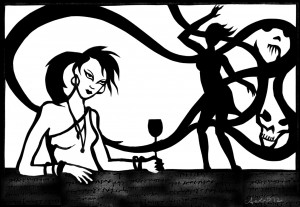
I originally wrote “The Library, After” at the very end of 2008; it was one of five unprompted Wind Tunnel Dreams flash stories. (Note: I dug this information out of my personal blog; in so doing, I found that I use the word “library” in WTD stories rather a lot.) Several of the stories in that series were tied to previous stories – “The Library, After” stood alone, and it turned out to be the one with staying power!
I started reading it at conventions – I tend to prefer to read flash and poetry, because it keeps a reading moving, switching gears. It built a small following. I think it’s the first story of mine that got fan art (though not the first to get fanfic), and that was before publication!
I had such affection for this story that, when I attended the Meet the Pros(e) party at Readercon 2009 (writers get one line from their work printed up on stickers and share it with people, creating a sort of absurdist poetry as you collect other people’s lines), I used a line from it: “Awakened, the library went feral.” I bounced up to Mythic Delirium editor Mike Allen and traded lines with him, and he said “Where is this from?” and then, “Has it been published?”
I sent him the story. And proceeded to forget that I’d ever done so. It was too short for his Clockwork Phoenix anthology series, and Mythic Delirium is a poetry magazine, so I was expecting nothing except that hopefully he’d enjoy it. But he ended up e-mailing me and asking if he could buy it for Mythic Delirium.
But – it’s not a poem, I said.
It’s poetic, he said.
Okay.
So trading stickers at a party at Readercon has led to the publication of a piece of my flash fiction in a poetry magazine. I do not have a problem with this! If you like posthuman postapocalyptic singularities with quantum unicorn PIs, you should look it up.
“The Library, After” was published in Mythic Delirium #24 in June 2011. (Art by Paula Friedlander.) It won the Rhysling Award and was nominated for the Micro Award.
__
Reviews:
Alexandra Seidel at Fantastique Unfettered says: “The sometimes mythical, sometimes delirious, but always adventurous journey ends with ‘The Library, After’ by Shira Lipkin. Herein, stories tell themselves to one another, they grow and change, revealing their protean nature, and they become something entirely new, leaving their shelves and finding adventure, which is probably what most of them were about anyway.”
Tori Truslow at Sabotage Reviews says: “And then Shira Lipkin’s ‘The Library, After’ comes along, magical and wry, a prose poem about an abandoned library where the books ‘told each other to each other’. You could read this as whimsy, you could read it as a bit of thumb-biting in the direction of rigid genre classifications – “New genres formed and split and reformed, tangents spilling out like capillaries. Freed of the responsibility to be useful and to fit human desires and expectations, Story explored itself in Mandelbrot swirls†– whichever way you look at it, it’s clever, funny and affirming. Literary fashions come and go – as we learn, ‘The science-noir-unicorn genre was shortlived’ – but story keeps on going. The image of stories continuing to twist and transmute after we’ve stopped looking at them is a perfect note to end on.”
Diane Severson Mori at Amazing Stories says: “A wonderful personification of the Library, in which the post-apocalyptic library ‘goes feral’, because the library has always felt like a friend to me.”




